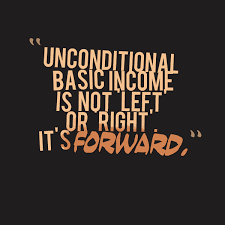I find the concept of “Universal Guaranteed Basic Income” (UGBI) so powerful I want to write about it every time I come across a new article. As you read more it becomes increasingly evident that UGBI could radically change so many negative aspects related to poverty, inequality and the stigma and degradation felt by those born in the wrong time / place or those who have made too many bad decisions. Yes, Universal Guaranteed Basic Income, if implemented will cost, but we are paying a steep price for the system we have now and some are paying with much more than money.
In the following article from The Nation Magazine, Fred Block and Frances Fox Piven suggest we need to take “a step toward something more radical: decoupling money and work by giving money to everyone.” They say “we have been ruled for years by archaic economic ideas.” Imbedded in the system and our subconscious are an abundance of negative and non productive ideas / results. Things like: “people who depended on … public assistance must always suffer more than those workers who were not on public assistance”, “poor relief … systems of assistance … they are also systems of degradation” and “condition(ing) whatever assistance was provided on close monitoring of the behavior of the poor, and also on (guaranteeing) rituals of public humiliation”. Historically conditions have often been even worse and remnants of those times persist in clouding our abilities to make real change. “In medieval England paupers were branded, put in the stocks, tied to carts on market day. In the 20th-century United States they were castigated as “welfare queens” and made to don orange DayGlo vests while they picked up trash in the parks.” Evidently we have not come all that far. How can new ideas like UGBI have an impartial opportunity when our societies are loaded down with such subconscious baggage?
Instead of continuing to tie all money to “wage work”, decoupling money and work by giving money to everyone”. They suggest abandoning “wage work … virtually a world religion” and replacing much of that giving people the “freedom to control (their) time should lie at the heart of any struggle”. The right, the wealthy, the powerful cringe at such thoughts, but “studies have definitively shown that there is no truth to the right wing claims that giving poor people money demoralizes them; it does the opposite.” It is even possible that “providing everyone with a basic income is an obvious way to make societies more resilient in the face of global climate change and it would slow the flow of refugees from economic hardship.” Even gradually toward UBGI “would represent a big break from the mix of poor relief and social insurance on which Western nations have relied. But it would also be a step toward something more radical: decoupling money and work by giving money to everyone.”
I left the article focusing on two, of many possible, questions posed by Block and Piven when thinking about UGBI:
- “If bad ideas are not allowed to die, will good ideas slip into obscurity?”
- “What would they do with their newfound free time?”
If you found this interesting, read the entire article, since I have only touched on it here.
